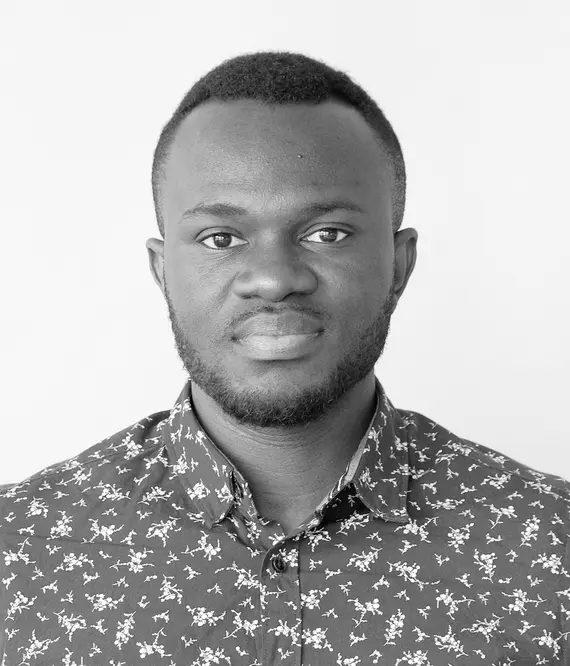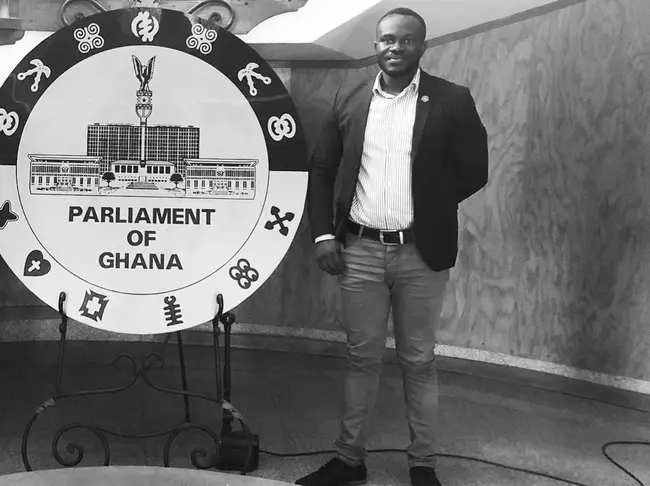RESEARCH INSIGHT ▼
LEGISLATIVE REPRESENTATION IS TERRIBLY UNDER-RESEARCHED
AN INTERVIEW WITH MARTIN ACHEAMPONG l by Madalena dos Reis Gonçalves

:::::::::::::::::::::::::::::::::::::::::::::::::::::::::::::::::::::::::::::::::::::::::::::::::::::
SHORT PROFILE
Name: Martin Acheampong
Field: Political Science
Country: Ghana
Occupation: Doctoral Fellow at the Bamberg Graduate School of Social Sciences
Research Interests: Parliaments in Africa, Elections, Representation, Legislative Behaviour,
Intra-Party Competition, Emerging Democracies, Political Institutions
:::::::::::::::::::::::::::::::::::::::::::::::::::::::::::::::::::::::::::::::::::::::::::::::::::::
▐ Martin Acheampong spent four weeks in Ghana to personally conduct interviews with Members of the Ghanaian Parliament for his doctoral research concerning legislative reperesentation in Africa.
Martin's study investigates the factors that influence processes of representation in contexts dominated by strong informal networks mixed with formal institutions. Drawing samples from Ghana and South Africa, he seeks to not only illuminate the circumstances under which legislators determine their priotities as representatives but also to create an explanatory model for legislative behaviour in new and emerging democracies.

Madalena dos Reis Gonçalves from our Marketing Department conducted an interview with him to highlight the experiences he made during his field trip abroad.
// At what point was it clear that you would have to go to Ghana to collect the data? Was it clear from the beginning?
M.A. As many of us may be aware, legislative representation is a terribly under-researched subject in African democracies. I therefore started out knowing about the data challenges I was likely to face. So gathering fresh data for the project was not a question that was in doubt from the very onset. It was thus clear that I needed to conduct some interviews in Ghana.
// Did the field research benefit you personally?
M.A. Of course it did! Doing fieldwork itself comes with a whole package of soft skills to the researcher. I did not only develop the competence of successfully negotiating interview access but also had to learn to deal with difficult respondents and manage awkward interview scenarios. Additionally, one has to learn to speak with utmost clarity devoid of scientific terminologies and also deal with positionality issues. In all, not only my research project but also my personal skill as a researcher benefitted from my stay in Ghana.
// How did the Graduate School support you during your field research?
M.A. In a lot of ways! First I had the opportunity to present my interview guide at the weekly colloquium, where I received very useful feedback. So I went to the field with an already refined guide. Also thanks to the Graduate School, my flight, accommodation and all additional expenses were generously funded. The Administrative office was also very supportive in making my travel arrangements stress-free. While in Ghana, I constantly relied on the unflinching support of my supervisor, Prof. Dr. Thomas Saalfeld who was always ready to skype with me whenever a difficult situation reared its head. Overall, my fieldwork wouldn’t have been possible without the assistance I received from the Graduate School.
// Interview: Madalena dos Reis Gonçalves
........................................................................................................................................................
MAIN PAGE | CONTACT | LEGAL | PRIVACY POLICY | DATENSCHUTZ | IMPRESSUM
© Bamberg Graduate School of Social Sciences
Image Credits: © Bamberg Graduate School of Social Sciences